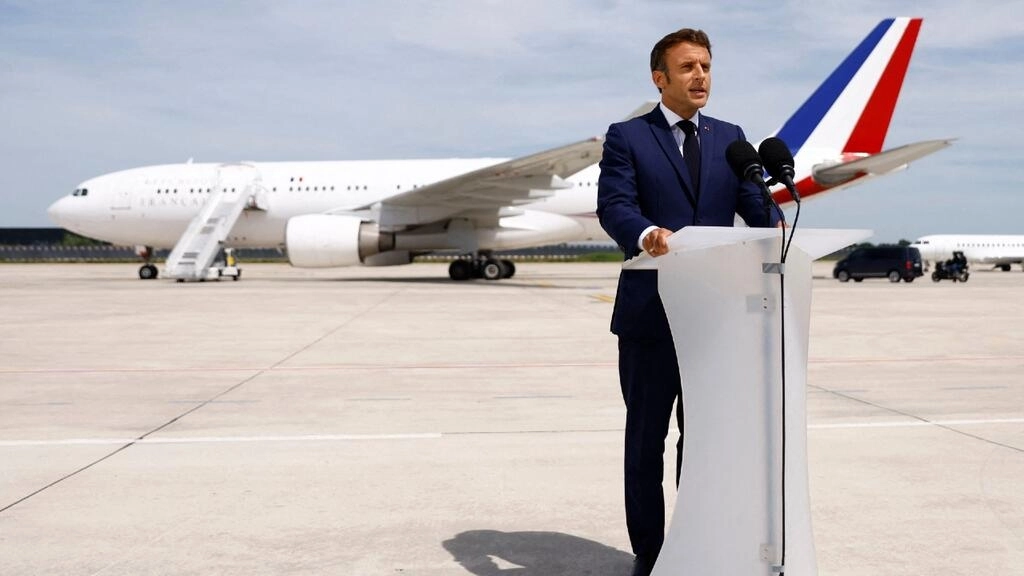Faced with the threat of a hung parliament, French President Emmanuel Macron’s ruling coalition has shifted its fire from the far right to a new left-wing bloc after a first round of parliamentary elections that exposed the inadequacy of its campaign and the narrowness of its support base.
. . . . . . . . . . . . . . . . . . . . . . . . . . . . . . . . . . . . . . . . . . . . . . . . . . . . . . . . . . . . . . . . . . . . . . . . . .
You know France’s presidential camp is in trouble when the commander-in-chief suits up for a tarmac address, complete with engines revving, to warn that an inconclusive election puts the nation in danger. That’s how Macron waded into the country’s legislative polls this week, urging voters to hand him a “strong majority” in the second and final round on Sunday – in the name of France’s “higher national interest”.
“In these troubled times, the choice you’ll make this Sunday is more crucial than ever,” Macron said on Tuesday, moments before boarding a flight to visit French troops stationed near Ukraine. “Nothing would be worse than adding French disorder to the world’s disorder,” he warned with the presidential plane in the background, his statement carefully choreographed for dramatic effect.
“Not one vote should be missing for the Republic,” the French president added, appearing to equate his own political fortunes with those of the country and its cherished republican regime.
Macron’s live statement was a reminder of the extraordinary backdrop to France’s latest electoral cycle, unfolding in the shadow of a catastrophic war that is fuelling instability, price spikes and food insecurity in parts of the world. It also highlighted the febrility that has gripped the presidential camp as it faces the prospect of a hung parliament thwarting its domestic agenda over the next five years.
Just weeks after securing his own re-election, the French president saw his ruling coalition slump to a dead heat in the first round of parliamentary elections on June 12, matched by a left-wing alliance cobbled together only last month. While the ruling party and its allies are still expected to win more seats in next Sunday’s run-offs, there is a significant chance they could fall short of an absolute majority.
Macron’s allies have described the prospect of a hung parliament as an electoral “anomaly” and a threat to the country’s stability. Hoping to drum up support ahead of Sunday’s run-offs, they have doubled down in their attacks against the leftwing “NUPES”, a broad alliance spanning the left of France’s political spectrum but dominated by the hard-left La France insoumise (LFI) of Jean-Luc Mélenchon.
The leftist firebrand is hoping to force the president into sharing power in a “cohabitation”. Moments after Macron’s airport statement, he mocked a “Trumpian stunt designed to raise the spectre of an enemy within”.
It wasn’t so long ago that Macron and his allies were busy cultivating Mélenchon’s supporters, whose votes they needed to defeat the far right’s Marine Le Pen in the April 24 presidential run-off. For all their differences, “Macronists” and “Insoumis” were allies in defending the Republic against the far right. As Macron’s ally Richard Ferrand, the head of the National Assembly, argued at the time, “we share common values”.
But that was then. Two months on, the ruling party has singled out the veteran leftist and his fledgling coalition as the new threat to the Republic. It has portrayed the NUPES as another extremist outfit – in the words of Macron’s former education minister Jean-Michel Blanquer, an extreme “just as dangerous as [Le Pen’s] far right”.
It’s a narrative that fits well with Macron’s moderate constituency, says Jean-Yves Dormagen, a professor of political science at the University of Montpellier and the head of polling institute Cluster17.
“What binds together Macron’s camp, more than a political project, is a rejection of extremism, of populism, of figures deemed too radical and extreme, like Mélenchon or Le Pen,” Dormagen said.
“When Macron presents himself as the head of the ‘republican camp’, of the party of order and stability, he highlights that which underpins his electoral coalition: namely a desire for good governance, stability, order and the status quo,” he added. “That’s the cement holding together his support base – a coalition of centre-right and centre-left voters who disagree on most other issues.”

